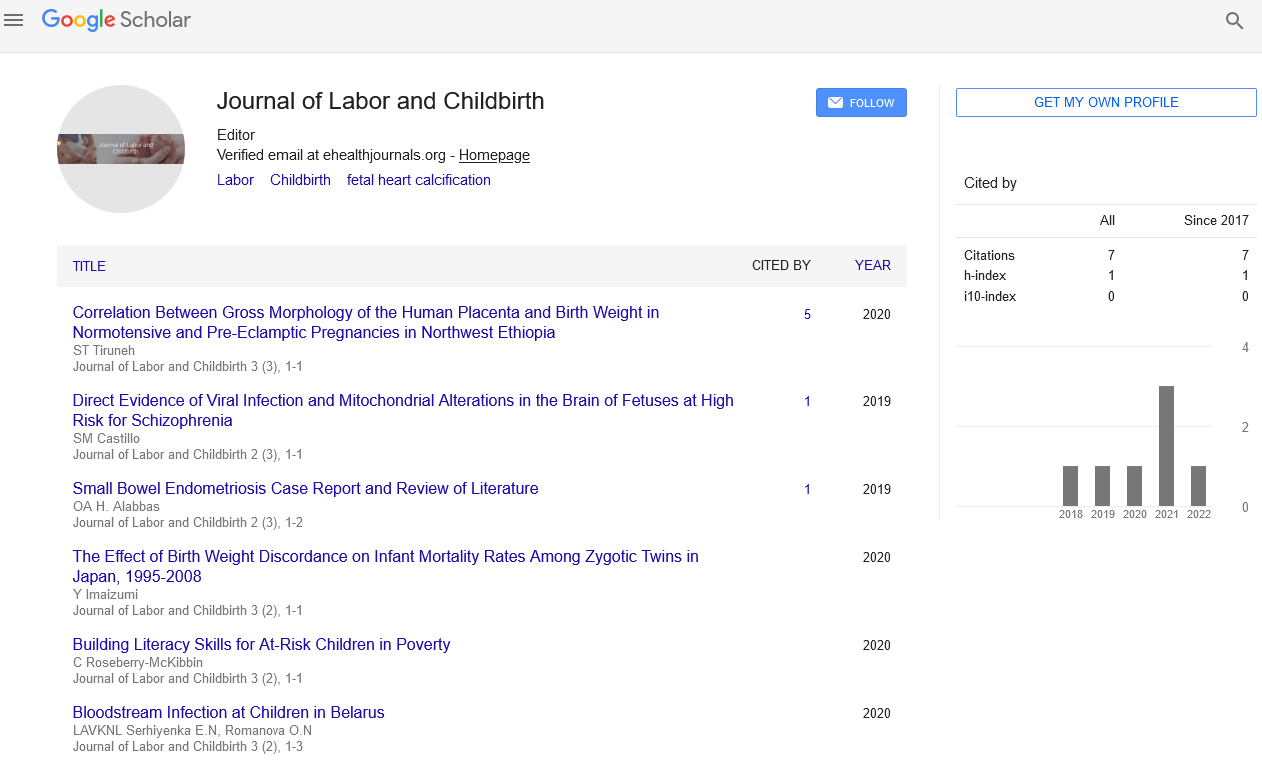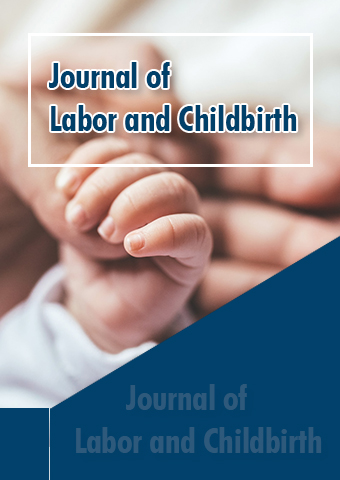Perspective - Journal of Labor and Childbirth (2024) Volume 7, Issue 2
Comprehensive Intranatal and Postnatal Care Services: A Holistic Approach to Maternal Well-Being
- Corresponding Author:
- Yuyu Chen
Department of Gynecology,
Hudan University,
Wuhan,
China
E-mail: chenyuyu32@yahoo.com
Received: 07-Mar-2024, Manuscript No. jlcb-24-129025; Editor assigned: 12-Mar-2024, PreQC No. jlcb-24-129025 (PQ); Reviewed: 26- Mar-2024, QC No. jlcb-24-129025; Revised: 03-Apr-2024, Manuscript No. jlcb-24-129025 (R); Published: 11-Apr-2024, DOI: 10.37532/jlcb.2024.7(2).197-198
Introduction
Maternal healthcare is a critical component of public health, focusing on the well-being of women during pregnancy, childbirth and the postpartum period. Intranatal and postnatal care services play a pivotal role in ensuring a healthy pregnancy and a smooth transition to motherhood. This article explores the various aspects of comprehensive intranatal and postnatal care services, emphasizing the importance of a holistic approach to maternal well-being.
Description
Intranatal care services
Prenatal education and counseling: The journey to motherhood begins with prenatal care, where expectant mothers receive essential education and counseling. Healthcare providers offer information on nutrition, exercise and lifestyle choices to promote a healthy pregnancy. Prenatal classes provide a platform for mothers to connect, share experiences and learn about the various stages of pregnancy.
Regular antenatal check-ups: Regular antenatal check-ups are crucial for monitoring the health of both the mother and the developing fetus. These check-ups include physical examinations, ultrasound scans and laboratory tests to detect and address any potential complications. Timely interventions during the intranatal period can significantly reduce the risk of adverse outcomes.
Nutrition and supplements: A well-balanced diet is fundamental for the health of both the mother and the baby. Intranatal care services emphasize proper nutrition and healthcare providers often prescribe prenatal supplements to ensure that mothers receive essential vitamins and minerals. Adequate nutrition contributes to fetal development and helps prevent complications such as low birth weight.
Emotional support: Pregnancy can bring about a range of emotions and emotional wellbeing is integral to a healthy intranatal period. Intranatal care services incorporate emotional support through counseling and support groups, addressing concerns related to anxiety, depression and stress. A positive emotional state contributes to a healthier pregnancy and can have lasting effects on the well-being of both the mother and the child.
Postnatal care services
Postpartum check-ups: Postnatal care begins immediately after childbirth and continues for several weeks. Regular postpartum check-ups are essential to monitor the mother’s physical and emotional recovery, assess the newborn’s health and address any concerns that may arise. These check-ups play a crucial role in detecting and managing postpartum complications.
Breastfeeding support: Breastfeeding is a critical aspect of postnatal care, providing essential nutrients and immune support to the newborn. Intranatal and postnatal care services often include lactation consultations, where mothers receive guidance on breastfeeding techniques, addressing common challenges and ensuring proper infant nutrition.
Postpartum nutrition and wellness: The postpartum period is a time of physical recovery and adjustment for the mother. Nutrition and wellness programs focus on restoring the mother’s health through a balanced diet, exercise and adequate rest. These services aim to prevent postpartum complications and support mothers in regaining their strength and energy.
Newborn care: In addition to caring for the mother, postnatal care services also focus on the health and well-being of the newborn. Healthcare providers conduct routine newborn screenings, including hearing tests, metabolic screenings and physical examinations, to identify any congenital abnormalities or health concerns. They also offer guidance on newborn care practices such as bathing, diapering and safe sleep practices to ensure the baby’s safety and comfort at home.
Family planning: Postnatal care includes discussions about family planning and contraception to help mothers make informed decisions about their reproductive health. Healthcare providers offer information on various contraceptive options, including hormonal methods, barrier methods and Long- Acting Reversible Contraceptives (LARCs) and assist mothers in choosing the method that best suits their needs and preferences. By providing access to effective contraception, postnatal care helps mothers plan and space their pregnancies, thereby promoting maternal and infant health.
Mental health services: Postpartum mental health is a significant concern, with conditions such as postpartum depression affecting a significant number of new mothers. Comprehensive postnatal care services prioritize mental health, offering counseling, support groups and therapy to address the emotional challenges that may arise during this period. Early detection and intervention are crucial for preventing long-term mental health issues.
Holistic approach to maternal well-being
Integration of traditional and modern approaches: Comprehensive intranatal and postnatal care services benefit from the integration of traditional and modern healthcare approaches. Combining evidence-based medical interventions with traditional practices ensures a holistic approach that respects cultural diversity and individual preferences. This integration enhances the effectiveness of care services and promotes maternal well-being across diverse populations.
Community engagement and outreach: To reach a wider audience and promote inclusivity, community engagement and outreach programs are essential components of intranatal and postnatal care services. These programs involve partnerships with local communities, educational institutions and non-governmental organizations to raise awareness, provide resources and offer support to expectant and new mothers.
Continuous education and research: The field of maternal healthcare is dynamic, with ongoing research contributing to advancements in intranatal and postnatal care. Continuous education for healthcare providers and the dissemination of updated information to the public are critical for ensuring the delivery of evidence-based and high-quality services. Research initiatives also play a vital role in identifying emerging challenges and developing innovative solutions for maternal care.
Conclusion
Comprehensive intranatal and postnatal care services are essential for ensuring the health and well-being of mothers and their newborns. The holistic approach discussed in this article, encompassing prenatal education, regular check-ups, emotional support and postpartum care, reflects a commitment to addressing the diverse needs of expectant and new mothers. By integrating traditional and modern approaches, engaging with communities and promoting continuous education and research, healthcare providers can deliver effective and inclusive maternal care services that contribute to the overall health of society. Investing in the wellbeing of mothers during the intranatal and postnatal periods is an investment in the health and prosperity of future generations.

